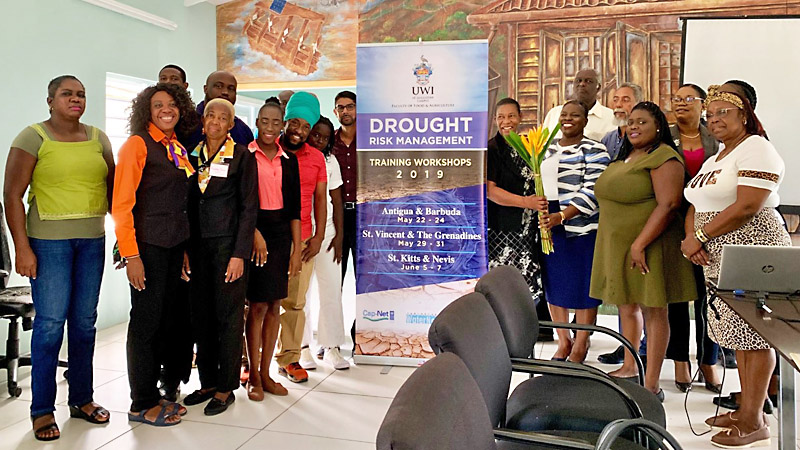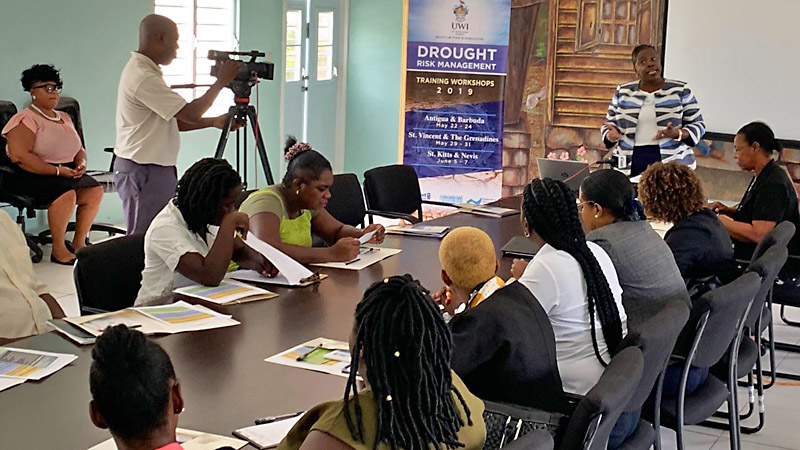Drought Risk Management Training workshop took place in St. John’s Antigua and Barbuda between 22–24 May. It was hosted by Caribbean WaterNet supported by CapNet UNDP, Global Water Partnership Caribbean and the Business Development Unit, Faculty of Food and Agriculture, University of the West Indies, St Augustine Campus.
During the workshop, participants were exposed to the following elements of Drought Risk Management: Drought Risk Management in the Caribbean; Drought Risk Occurrence, Vulnerability and IWRM; Vulnerability and Impacts of Droughts; Drought Risk Management Framework; Drought Risk Characterization and Monitoring Using Remote Sensing; Drought Preparedness, Emergency Management and Recovery; and Early Warning System.
Course content and sessions were facilitated by three specialists: Professor Jacob Opadeyi, Dr. Ronald Roopnarine and Dr. Mark Wuddivira. Workshop consisted of 28 participants from multiple state agencies that are involved in various aspects of water management (agriculture, tourism, waste water treatment etc.) and Non-Governmental Organizations.
Over 60% of the participants were female. This was a refreshing statistic, which shows the improvement in equity as it pertains to gender roles in the Caribbean Region and the commitment of female participants towards knowledge acquisition and desire to contribute to their national circumstance.
Workshop was opened by the Honorable Samantha Marshall, Minister of Social Transformation in Antigua and Barbuda. She highlighted the current crisis as it pertains to the largest ground water reservoir at the Pot Works. This reservoir, according to Minister Marshall, accounts for 85% of the countries water storage. It is currently dry, forcing the government to further invest in desalination, which is eight times as expensive when compared with treatment cost for ground water. Minister Marshall also expressed the need to diversify the water sources utilized in the country. Now the main water source on the islands is desalination, which has been compromised by the recent influx of sargassum and turbulent waters.
Minister Marshall mentioned her desire for communities to come together and emulate communities like Barnes Hill and Freetown to employ indigenous knowledge and adaptation techniques at a community level to increase their resilience. She highlighted the innovations by a local farmer and innovator, Mr. Bernard Nichols, who is the owner of Valley Farms. His innovation and indigenous knowledge has allowed him to design small ponds in such a way that it creates a higher pseudo “water table” which benefits his fruit trees. Mr. Nichols uses his waste to fertilize and improve his soils to the benefit his flower plants, which in turn significantly increases the suitability of habitats for pollinators.
Ms. Ruth Spencer, GEF/SGP, National Coordinator in Antigua and Barbuda, spoke about the national importance of the training workshop and the need for capacity building as it pertains to drought risk management in Antigua and Barbuda. She also expressed gratitude to the hosts of this workshop for their respective roles in coordination and facilitation.
The three days resulted in some enlightening and informative discussions. Some of the main discussion topics were:
– Institutional Challenges
– Lack of coordination between agencies; political influences; and lack of financial and human resources
– Need to diversify water sources
– Methods to influence policy makers to adopt the concept of data driven decision making
– Regional policy on drought risk management
– Role of NGOs in influencing national policy as it pertains to Drought Risk Management
– Public education and awareness
The workshop was well received by all participants who expressed their gratitude for the knowledge passed on to them and assured facilitators that they will actively attempt to utilize the knowledge gained in their respective fields.
Caribbean WaterNet along with its collaborators continues the efforts to build capacity in the Caribbean with three additional training workshops scheduled for St. Vincent and The Grenadines, St. Kitts/Nevis and Belize in the weeks to follow.
Video of the workshop:


